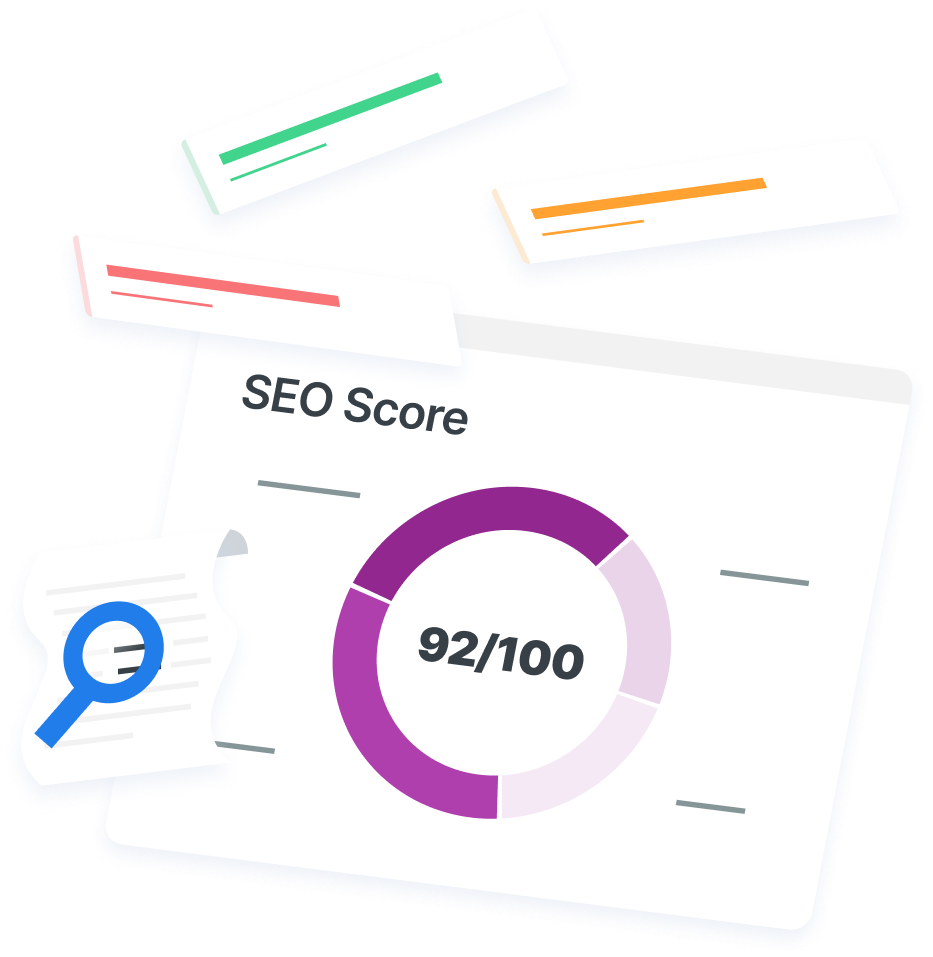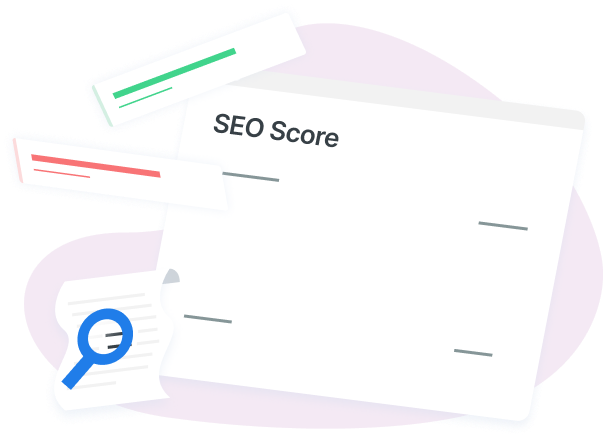-
 7 min. read
7 min. read
-
 Trevin Shirey
Trevin Shirey VP of Marketing
VP of Marketing
- Trevin serves as the VP of Marketing at WebFX. He has worked on over 450 marketing campaigns and has been building websites for over 25 years. His work has been featured by Search Engine Land, USA Today, Fast Company and Inc.
So your time and effort has paid off, and you’re ranking number 1 on the Google search results page for your targeted keywords. What now? If your answer is “sit back and enjoy the traffic,” I’ve got some bad news: you’re not finished.
Considering that the first result in Google’s search results receives about 33 percent of the clicks on the page, there are going to be plenty of competitors attempting to take that spot away from you. So how do you hold on to the coveted position you’ve acquired? Here are a few SEO tips for your top ranking company that will help you be proactive in maintaining your spot.
Why should you continue SEO on your site?
In order to understand what you can do to stay at the top, you should first get an idea of what could potentially cause you to fall in the search results if you stop doing SEO.
Competition doesn’t go away
Think about how long it took for you to become the first result on the page, and how badly you wanted to knock down the companies that ranked above you. Now, you are the business that others are attempting to beat.
You can be fairly certain that other companies are going to do some serious research on your site and links, just like you did to the sites that previously occupied number 1 spot.
Algorithm updates are inevitable
Considering that Google changes its search algorithm around 500-600 times a year, you can’t be sure that your site or page will stay in the same place. As a result, you should keep an eye on your rankings, and understand that if they fluctuate, you may lose the top spot.
Better content is always being created
Your content may be relevant now, but the keywords you used could become outdated. Depending on the subject matter, your page could become old news within a few weeks. Even if that isn’t the case, and your information is not timely, there is always the chance that someone else will write something better.
Even though the content you have at this exact moment is enough to earn you a number 1 ranking, the older it gets and the more competition it gains, the less worthy Google will consider it. No matter how timely and relevant your information is right now, it will eventually become outdated, and Google does not want to present users with old material.
What you can do to stay #1
Now that you know what causes sites to slip in the rankings, how can you prevent those things from happening to your business?
Make sure that the page is optimized for clicks
Take advantage of your prime Google real estate by making sure that as many users click on your site as possible. You can maximize the benefits of your high ranking by writing meta descriptions that will entice people to click. Words and phrases like “how to,” “free,” “tips,” “why,” “best,” and “tricks” tend do a great job of this.
You can also use the steady traffic you’re likely getting to test what does and doesn’t work for conversion once visitors are on the page. Conversion rate optimization, or CRO, can help you make informed decisions about changing your pages, get better results from your website, and learn more about your visitors.
Get even more links from other sites
Although there’s a good chance that your website already has a wide variety of links if it is ranking number 1 on Google, that doesn’t mean you should stop building.
It isn’t really possible to have too many links, as long as they are quality ones, and you can leverage your position as a highly-ranked site to get others to link to you. By continuing with the same strategies you used to build links in the first place, you should be able to solidify your top spot on the results page.
Improve your internal linking
In addition to gaining links from other sites, linking to your own pages within your site is also key to maintaining a good search ranking.
This is something that you’ve hopefully been doing since you started your site (or started optimizing it), but if not, now is as good a time as any to get started. You don’t need to immediately start stuffing your pages with links to other pages. Look for places where your content seems naturally related.
You can easily build links within your site with small additions like, “For more information on _____, this is a great resource.” Internal linking will also help your individual pages rank for long-tail keywords. Using anchor text that is specific to the page, as opposed to broad site keywords, will help with this. Keep this in mind as you add new pages to your site over time.
Think about the content you already have that is related to what you are writing, and consider adding a link. Don’t force any internal links if you don’t think theywill be beneficial to readers, but a quality link that improves a reader’s understanding is a great addition to your site.
Monitor your site speed
Once users are on your page, you need to make sure that they stay there long enough to read your content, and hopefully click through to other pages.
High bounce rates will cause you to move down in the rankings, so you want to make sure that nothing about your site immediately drives users away. Slow websites tend to drive up bounce rates, so keep an eye on your site’s speed. Google Page Speed is a good tool to identify issues that are slowing your pages down, and can help you figure out how to fix them.
This collection of site speed tools is also a great resource if you know that you have a slow site but don’t have the tools to go about fixing it. 
Make your site responsive
As mobile and tablet devices become more popular ways to browse the Internet, it is important to make your site compatible with these devices. If your pages are hard to read or awkward to browse on smartphones, your bounce rate could skyrocket, knocking you down in the rankings.
If you are unsure of how to make sure that your site is responsive, read our page on the importance of responsive design.
Keep your site updated
In order to maintain your high rank, you need to continuously update your pages. This doesn’t mean doing a complete site overhaul every month, but simply monitoring the relevance of your pages and making sure that they don’t become outdated.
If the content on your site is not time-sensitive, consider starting a blog. This will give you a way to not only maintain the “freshness” of your site, but also discuss industry news and events. This can lead to more visitors and social shares, which can only help your site.
There is no specific formula for continuing to be the number 1 result on Google, but a combination of the above SEO tips for your top ranking company should prevent you from any major falls. And if you’ve already achieved that high ranking, there’s a good chance that you already have a solid SEO strategy in place. Have any questions about SEO?
Need assistance improving or maintaining your site’s rank? Feel free to contact us or leave a comment below. We’re more than happy to help with any of your SEO needs!
Photo credit: Leo Reynolds
-
 Trevin serves as the VP of Marketing at WebFX. He has worked on over 450 marketing campaigns and has been building websites for over 25 years. His work has been featured by Search Engine Land, USA Today, Fast Company and Inc.
Trevin serves as the VP of Marketing at WebFX. He has worked on over 450 marketing campaigns and has been building websites for over 25 years. His work has been featured by Search Engine Land, USA Today, Fast Company and Inc. -

WebFX is a full-service marketing agency with 1,100+ client reviews and a 4.9-star rating on Clutch! Find out how our expert team and revenue-accelerating tech can drive results for you! Learn more
Try our free SEO Checker
Boost your site’s search performance with our free SEO Checker. Analyze your website for optimization tips on titles, headers, content, speed, and more. Get a free report now to enhance rankings on Google, Bing, Yahoo, and beyond!



How Is Your Website’s SEO?
Use our free tool to get your score calculated in under 60 seconds.
Try our free SEO Checker
Boost your site’s search performance with our free SEO Checker. Analyze your website for optimization tips on titles, headers, content, speed, and more. Get a free report now to enhance rankings on Google, Bing, Yahoo, and beyond!







